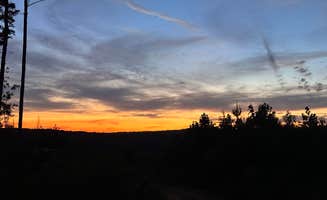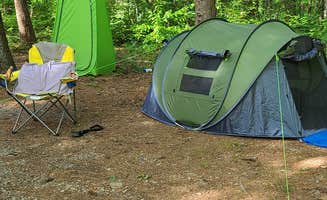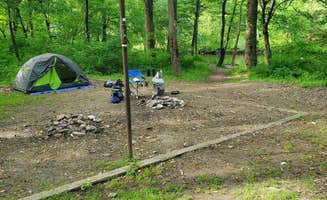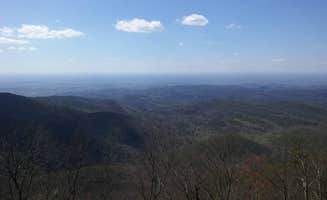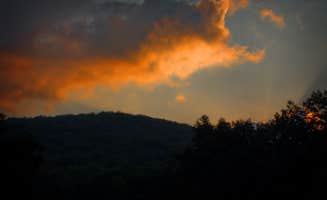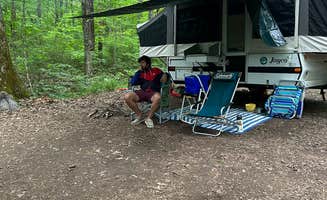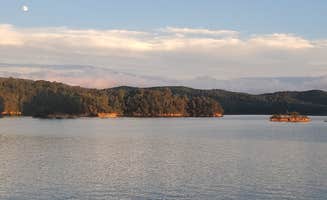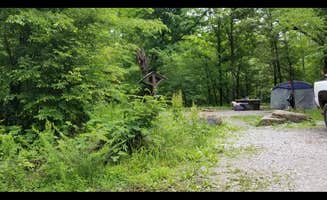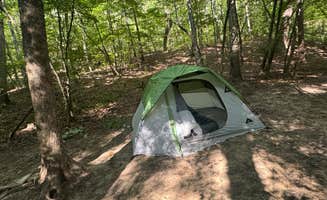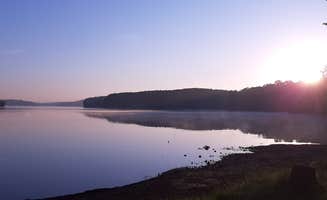Rustic camping near Ooltewah, Tennessee offers backcountry experiences at elevations ranging from 700 to 4,000 feet across the surrounding Cherokee National Forest and Cohutta Wilderness areas. Winter closures affect accessibility to many dispersed sites, particularly in Prentice Cooper State Forest where nearly all camping areas close between December and March. Forest service roads leading to these sites can become extremely dusty during summer months, creating visibility challenges for drivers navigating to remote locations.
What to do
Wildlife viewing opportunities: Prentice Cooper State Forest Dispersed contains numerous forest trails with established sites for spotting native species. One camper noted, "We ran a bunch of the trails - enjoyed the views - wonderful spot." Fishing is popular at Davis Pond, where anglers report success with largemouth bass.
Astronomy and stargazing: The Ball Field Dispersed Camping Area offers exceptional night sky viewing due to minimal light pollution. "I searched on terrain maps for some of the best south facing skies for a great view of the belt of the milky way. Go here on a new moon night in the summer and you're sure to have a great night of uninterrupted beauty," shares one camper.
Swimming in clear water: Warm weather camping includes access to swimming holes near several sites. At Conasauga River Camp, you can enjoy "a very swimmable and warm crystal clear river," which a camper describes as "very popular with locals, and I imagine would be packed on weekends."
What campers like
Secluded camping locations: Campers appreciate the privacy found at many dispersed sites. At Tennessee Wall Camp, visitors enjoy "a parking lot right off the road after a fun ~30 minute drive through residential roads right on the water, then sites with fire pits are scattered throughout a small clearing."
Natural water features: Most primitive sites feature creeks or ponds for recreation. "There's a lake, but it's not all that pretty. There's a boat ramp, but the lake is small and I doubt it's worth the trouble," reports a camper at Murrays Lake Primitive, showing that water quality varies across locations.
Seasonal beauty: Fall colors transform the camping experience in these forests. A visitor to Prentice Cooper mentioned, "We came here to camp among the turning trees one September. It is a huge area and I didn't see any camping other than primitive tent sites. The fall colors were off the hook but might be even better in October."
What you should know
Seasonal closures: Winter access is severely restricted at many sites. A camper at Prentice Cooper warns, "This is a beautiful WMA area with tons of offshoots along a service road for camping, but please note, 99% of areas are closed between December and March. Had to turn around and find somewhere else to camp for the night."
Bathroom facilities: Most dispersed sites lack functional restrooms. At Lost Creek Campground, "The restroom, although primitive (no water—bring along some hand sanitizer), is incredibly clean."
Noise considerations: Despite remote locations, some sites experience unexpected noise. A camper at Prentice Cooper reported, "Night time is great but gunshots started at 6:30 at a nearby gun range and dirt bikes started hitting the roads not much later."
Cell service limitations: Communication is unreliable throughout the region. At Lost Creek, campers note there is "no Verizon cell reception," requiring advance planning for navigation and emergency needs.
Tips for camping with families
Trail difficulty assessment: When hiking with children, choose appropriate trails. At Jack's River Falls Trail/Cohutta Wilderness Backcountry Group Camp, one parent advises, "This is a tough trail but good for teens looking to challenge themselves in the back country. The views are amazing with rock falls."
Group site selection: Families should target locations with space for multiple tents. Jack's River Falls offers an area where "We had a group of 10 that spread out over this little 'island' very easily. There were two campfire areas already in place and most sites very level and well covered by trees."
Water recreation options: Plan water-based activities for summer visits. At Blue Hole Dispersed camping area, you can explore "a blue hole and caves," though a visitor cautions about the importance of timing: "It has a blue hole and caves no electricity or running water but the camp sites are pretty good."
Tips for RVers
Access and vehicle considerations: Most primitive sites have challenging access roads. At Blue Hole Dispersed- Crockford-Pigeon Mountain WMA, visitors note that "Road is pretty well maintained, spots are good size, some only large enough for tent/car camping. We stayed 3 days 2 nights here in our 21' pop up camper with our generator."
Site leveling requirements: RVs need leveling equipment at most locations. The Ball Field Dispersed Camping Area has a field that "is fairly sloped, so you want to have some shoring if you are in a trailer, roof top tent, or van."
Dedicated RV spaces: Limited options exist for larger vehicles. Blue Hole Dispersed has "a handicap access area for RVs to do disperse camping also and parking for the bluehole," providing one of the few accommodations specifically designed for recreational vehicles.


